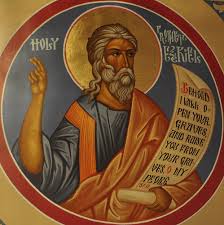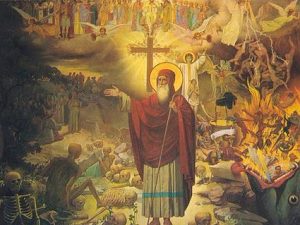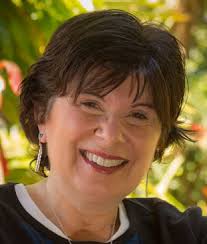Love as Fraternal Correction, Forgiveness and Worship
(Ezekiel 33:7-9; Psalm 95; Romans 13:8-10; Mt 18:15-20)
*************************************************************
How would you summarize the bible in one sentence?
The answer by St. Paul in the second reading is very simple, “Love your neighbor as you love yourself.”
It is clear that our number one priority must be to love sincerely. However, there are many ways to express love. Today’s readings highlight three key ways – fraternal correction, forgiveness and worship.

The prophet Ezekiel
Fraternal correction isn’t something that is mentioned or talked about very much in either the Church or our society these days. Ezekiel, in the first reading, writes about fraternal correction as a mandate given to him directly by God. As a prophet called to speak the truth, unpleasant as that truth may be, he was appointed by God to be a sentry to the House of Israel, to point out their fault, to warn them to renounce their sin and infidelity, to change their ways.

If Ezekiel does this, even if they do not repent and change, he will have saved his life. But if he does not do this, then he is told that he will responsible for the consequences of the other’s wrongdoing. This is a heavy burden laid on Ezekiel, and on us as well. We also share the burden of fraternal correction – of warning our brothers and sisters when they stray from the teachings of Jesus and are doing wrong.
Bob, a member of a religious community, was beating himself up for having resigned from an important position in his community. A friend who witnessed this, felt concern for him, came up to him and told him, “Your refusal to forgive yourself is worse than anything else you have ever done.” That one statement of fraternal correction was enough to nudge Bob towards finally forgiving himself and made a huge difference in his life.
This kind of fraternal correction is one way that we are being asked to express love to others. Another is through forgiveness.
The gospel today is actually a mini-manual on how to forgive. It is also probably one of the most critical yet least appreciated passages in the bible. In it, Jesus is giving us a very simple formula on how to forgive: All we have to do, when hurt by someone, is to go to that person alone and share our feelings with him or her. If the abuser will not listen then we can take others with us. If they still don’t listen, then we are to treat them like tax collectors or Gentiles.
The key to understanding that last phrase is to realize that in the Gospel of Matthew, the tax collector is Matthew himself. And in the Gospel of Matthew, we are told to go to all the gentile nations and teach them to keep the commands of Jesus, to love and forgive one another. What Matthew is saying is to treat them like Jesus treated him – he forgave him and called him to discipleship. We are to forgive and keep on forgiving.
Presenter of retreats and spiritual writer Paula D’Arcy lost her husband and daughter in an accident caused by a drunk driver. That loss devastated her life. For months, she was like a zombie. It took her years to cope with her loss. In the process, she ended up in court face-to-face with the young man who caused the accident. Somehow, perhaps because of her strong faith background, she felt surging up within her a powerful force of forgiveness. What happened to her was visible to her lawyer when he saw how she looked at the defendant on the stand. She could only say that she saw Jesus in that young man’s eyes, understood him and no longer felt anger towards him, even if he lied on the stand and expressed no remorse. Such was the power of her love that she forgave just as Jesus forgave on the cross.

Paula D’Arcy who conducted retreats at Star of the North Retreat Centre
Jesus adds an important teaching – that when we forgive someone here on earth, that forgiveness happens in heaven as well. To forgive someone else is to help build up the reign of God here on earth and also in heaven. To refuse to forgive someone is to hold back the growth of the kingdom of God here on earth, and in heaven as well.
John decided to live out today’s gospel by writing a letter to his deceased father as a way of trying to forgive him for the hurtful way that his addicted father had raised him. He poured into that letter all his emotions that he had never shared with his father while he was still alive, read it to a pillow and shed a few tears. A week later, his counselor asked if it felt more like an adult-to-adult relationship with his father now. John was startled. That was it – he was no longer the kid and his father the big daddy – they were now friends! John was moved to the depths of his being as he realized that if he was healing in his relationship with his deceased father, then his father was healing in his relationship with him. The words “what is loosed on earth is loosed in heaven” suddenly took on profound meaning. He was experiencing the communion of the saints!
In the last line of today’s gospel, Jesus adds another way that we can express our love, this time for him, and that is through worship. When two or three are gathered in his name, he is there among us. When we gather together to pray or to worship, there is a special presence of Jesus among us. What great motivation for us to celebrate and worship as we are doing now – for Jesus is truly among us!
The Eucharist is in itself an experience of forgiveness. Through word and sacrament, we are forgiven, healed and transformed into the Body of Christ who is forgiveness. We are then commissioned to go out and practice that same forgiveness.
So, inspired by the Word of God today, let us continue building up the reign of God through love expressed by fraternal correction, forgiveness and worship.



